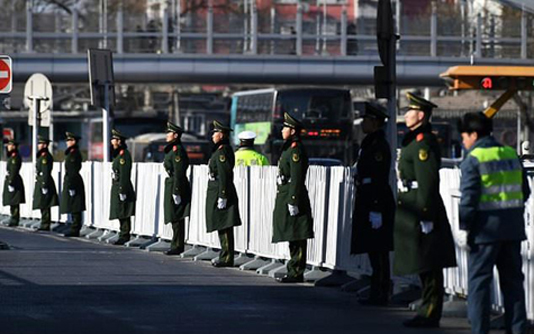SEOUL, Jan 8, 2019 (BSS/AFP) – North Korean leader Kim Jong Un’s surprise
trip to China could herald a new round of summitry on and about the
peninsula, analysts say, but may also be an attempt to pressure US President
Donald Trump as negotiations between them falter.
Discussions between Pyongyang and Washington over the North’s nuclear
arsenal have stalled since Kim and Trump’s high-profile summit in Singapore,
with the US insisting that sanctions must remain in place until it gives up
its weapons, and the North demanding an immediate easing.
In his New Year’s address — always a key moment in the North Korean
political calendar — Kim said that if Washington persisted with its
approach, “we may be left with no choice but to consider a new way to
safeguard our sovereignty and interests.”
With his visit to China, “Kim is eager to remind the Trump administration
that he does have diplomatic and economic options besides what Washington and
Seoul can offer,” said Harry Kazianis of the Center for the National Interest
in Washington.
The US should be “quite concerned” by any effort by Pyongyang to strengthen
ties with Beijing, he added, as almost all North Korean trade flows through
China and any improvement in relations would weaken the Trump
administration’s “maximum pressure” strategy.
With US and Chinese officials meeting in Beijing to address a trade row
that has roiled global markets, he said, “the timing could not be any better”
for the Chinese side. “It shows Beijing clearly has a North Korea card to
play if it sees fit.”
Chinese forces played an integral role defending the North during the 1950-
53 Korean War, and Beijing remains Pyongyang’s key diplomatic backer and
trade partner.
It has always feared the collapse of its neighbour, which would threaten
floods of refugees streaming onto its territory and the prospect of US troops
stationed on its border in a unified Korea, but in recent years became
increasingly frustrated with its nuclear antics.
That changed last spring, when Kim ended six years as a diplomatic recluse
to go to Beijing and pay his respects to Xi in his first overseas trip as
leader.
A series of visits have followed in both directions — although Xi has yet
to reciprocate with a trip to Pyongyang — along with three summits between
Kim and the South’s President Moon Jae-in, and Beijing lent Kim a plane to
travel to Singapore.
– ‘Sanctions relief’ –
At their meeting Kim and Trump signed a vague pledge to work towards
denuclearisation of the Korean peninsula in a blaze of publicity, but the two
sides have since disagreed over what that means.
Kim did not visit Seoul by the end of last year, despite South Korea’s Moon
suggesting he would do so, but speculation of a second Kim-Trump summit to
try and break the deadlock has mounted.
A location for the meeting was being negotiated, the US president said at
the weekend, leading sceptics to express hopes that its substance and
outcomes were also being discussed.
Kim’s Beijing trip was an indication he could soon travel to Seoul or hold
a second summit with Trump, said Cheong Seong-chang, a senior researcher at
the Sejong Institute in Seoul.
Last year Kim visited China ahead of his summits with both Trump and Moon,
he pointed out.
The accompanying delegation, he noted, included Kim Yong Chol, North
Korea’s counterpart to US Secretary of State Mike Pompeo in talks, suggesting
that “sanctions relief for Pyongyang” would be on the agenda.
Under Moon, the South has pursued engagement with the North, and analysts
in Seoul argued that Chinese concessions could improve the prospects of a
deal.
“North Korea could feel insecure or threatened if it gives up its nuclear
programmes entirely,” said Koh Yu-hwan, professor of North Korean studies at
Dongguk University.
“But if Beijing promises Pyongyang that it will provide economic assistance
and guarantee its regime security if Pyongyang abandons atomic weapons, it
could make the North feel more secure,” he told AFP.
Beijing shared Washington’s aim of denuclearising Pyongyang, he added, and
was “not trying to interfere in the ongoing process between the North and
US”.
Despite pledges by the Koreas last year to pursue a declaration that the
Korean War — which ended only in an armistice — is over, little progress
has been made, let alone on a full peace treaty.
Beijing sides with Pyongyang on formally ending the three-year conflict,
but some suspect North Korea wants to use that to demand US troops in South
Korea are withdrawn from the peninsula.



